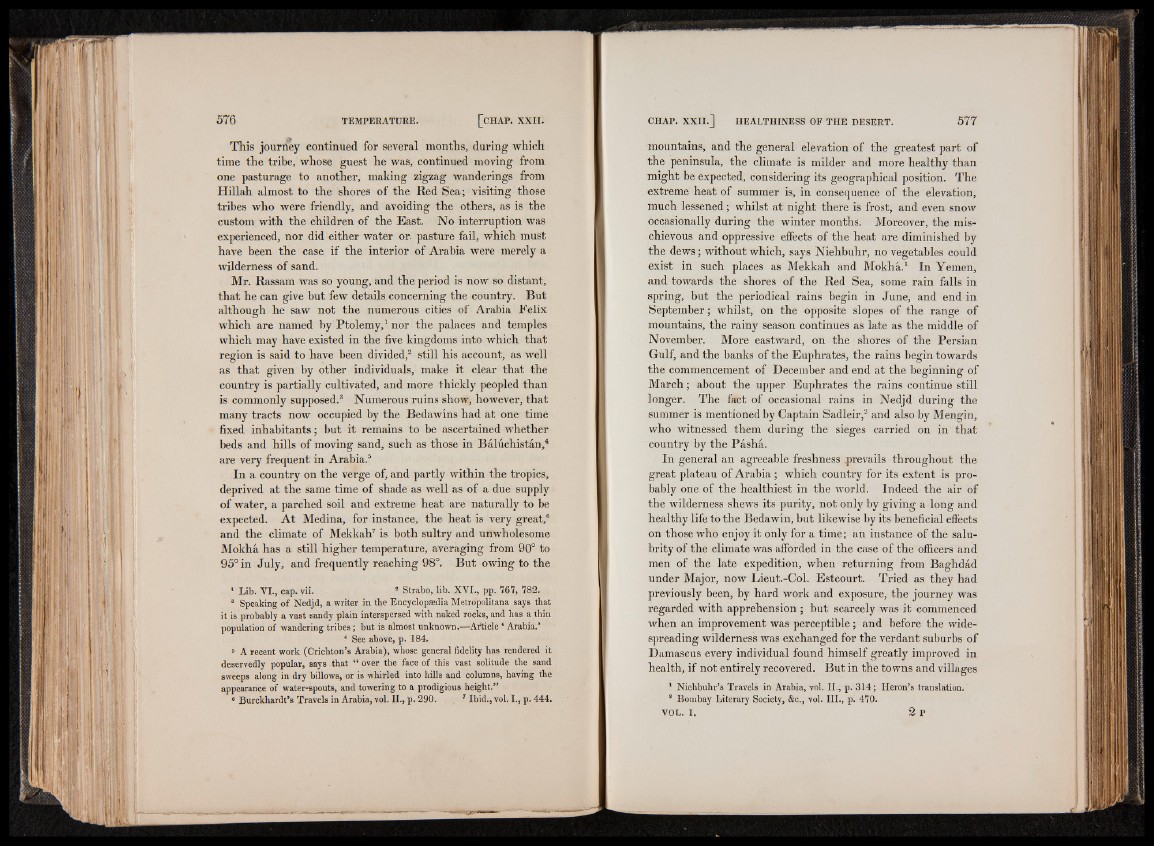
This journey continued for several months, during which
time the tribe, whose guest he was, continued moving from
one pasturage to another, making zigzag wanderings from
Hillah almost to the shores of the Red Sea; visiting those
tribes who were friendly, and avoiding the others, as is the
custom with the children of the East. No interruption was
experienced, nor did either water or. pasture fail, which must
have been the case if the interior of Arabia were merely a
wilderness of sand.
Mr. Rassam was so young, and the period is now so distant,
that he can give but few details concerning the country. But
although he saw not the numerous cities of Arabia Felix
which are named by Ptolemy,1 nor the palaces and temples
which may have existed in the five kingdoms into which that
region is said to have been divided,2 still his account, as well
as that given by other individuals, make it clear that the
country is partially cultivated, and more thickly peopled than
is commonly supposed.3 Numerous ruins show, however, that
many tracts now occupied by the Bedawins had at one time
fixed inhabitants; but it remains to be ascertained whether
beds and hills of moving sand, such as those in Baluchistan,4
are very frequent in Arabia.5
In a country on the verge of, and partly within the tropics,
deprived at the same time of shade as well as of a due supply
of water, a parched soil and extreme heat are naturally to be
expected. At Medina, for instance, the heat is very great,6
and the climate of Mekkah7 is both sultry and unwholesome
Mokha has a still higher temperature, averaging from 90° to
95° in July, and frequently reaching 98°, But owing to the
1 Lib. VI., cap. vii. 2 Strabo, lib. XVI., pp. '761, 782.
3 Speaking of Nedjd, a writer in the Encyclopaedia Metropolitana says that
it is probably a vast sandy plain interspersed with naked rocks, and has a thin
population of wandering tribes; but is almost unknown.—Article ‘ Arabia.’
4 See above, p. 184.
s A recent work (Crichton’s Arabia), whose general fidelity has rendered it
deservedly popular, says that “ over the face of this vast solitude the sand
sweeps along in dry billows, or is whirled into hills and columns, having the
appearance of water-spouts, and towering to a prodigious height.”
• Burckhardt’s Travels in Arabia, vol. II., p. 290. 7 Ibid., vol. I., p. 444.
mountains, and the general elevation of the greatest part of
the peninsula, the climate is milder and more healthy than
might be expected, considering its geographical position. The
extreme heat of summer is, in consequence of the elevation,
much lessened; whilst at night there is frost, and even snow
occasionally during the winter months. Moreover, the mischievous
and oppressive effects of the heat are diminished by
the dews; without which, says Niehbuhr, no vegetables could
exist in such places as Mekkah and Mokha.1 In Yemen,
and towards the shores of the Red Sea, some rain falls in
spring, but the periodical rains begin in June, and end in
September; whilst, on the opposite slopes of the range of
mountains, the rainy season continues as late as the middle of
November. More eastward, on the shores of the Persian
Gulf, and the banks of the Euphrates, the rains begin towards
the commencement of December and end at the beginning of
March; about the upper Euphrates the rains continue still
longer. The fact of occasional rains in Nedjd during the
summer is mentioned by Captain Sadleir,2 and also by Mengin,
who witnessed them during the sieges carried on in that
country by the Pasha.
In general an agreeable freshness .prevails throughout the
great plateau of Arabia ; which country for its extent is probably
one of the healthiest in the world. Indeed the air of
the wilderness shews its purity, not only by giving a long and
healthy life to the Bedawin, but likewise by its beneficial effects
on those who enjoy it only for a time; an instance of the salubrity
of the climate was afforded in the case of the officers and
men of the late expedition, when returning from Baghdad
under Major, now Lieut.-Col. Estcourt. Tried as they had
previously been, by hard work and exposure, the journey was
regarded with apprehension ; but scarcely was it commenced
when an improvement was perceptible; and before the wide-
spreading wilderness was exchanged for the verdant suburbs of
Damascus every individual found himself greatly improved in
health, if not entirely recovered. But in the towns and villages
1 Niehbuhr’s Travels in Arabia, vol. II., p. 314; Heron’s translation.
2 Bombay Literary Society, &c., vol. III., p. 470.
VOL. I . 2 P